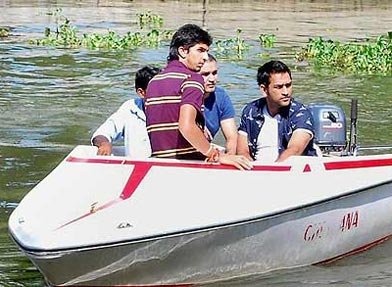
Virender Sehwag's revolt against the Delhi and District Cricket Association (DDCA), alleging nepotism and corruption in the selection of state teams and continued interference by the sports committee has seen more players, both former and present, voicing their displeasure at the manner in which cricket's governing body in the Capital runs the sport.
This, however, is not the first time that Delhi players have taken on the administrators over "injustice" done to them. There have also been precedents where senior cricketers have threatened to leave the state.
In 1980, Bishan Singh Bedi led the first major revolt against the then DDCA president, Ram Prakash Mehra. Delhi had won the Ranji Trophy two seasons ago and captain Bedi wanted the association to give more money to the players.
Mehra refused and a defiant Bedi was dropped ahead of the match against Haryana in Rohtak. In a hurry, Vinay Lamba was asked to lead the team but he was left with only four-five players on the field after the likes of Madan Lal, Rakesh Shukla and Sunil Valson, among others, walked out in support of Bedi. The management hastily summoned uncapped players — Sudhir Pathak, Arun Khurana, among others — from the Capital to play, before deciding to concede the match. Madan Lal and Shukla, though, rolled back on their decision later and joined the Delhi team for later games.
However, the players' opposition did eventually bring the Mehra regime to an end. Interestingly, Sunil Dev, who is now the DDCA sports secretary, played a major role in that episode, siding with Bedi and other senior players.
After that incident, DDCA witnessed a series of protests, though none on a big scale.
In 1984, former Delhi opening batsman and skipper Venkat Sundaram took a delegation of players to the then Prime Minister, Rajiv Gandhi, seeking his intervention in setting things right at the DDCA, which at the time was led by Kamal Nath. The players wanted the prevailing proxy system of voting — under which a member can nominate another person to vote on his behalf — to be done away with. Later, Bedi and other players, including Manoj Prabhakar, also led an agitation against the system. There was little success this time and proxies still rule at the DDCA.
In 1990, Madan Lal and a few former cricketers, including Kirti Azad, Surender Khanna, Venkat Sundaram, started 'Operation DDCA Clean-up'. "The present DDCA officials have had a long innings. It is time for them to quit. We have had enough of their nonsense," Madan had said. He expressed his displeasure at the factionalism in Delhi cricket. The former India all-rounder holds the same views even today.
The latest revolt by Sehwag is mainly against the sports committee, which is a medium to appease 114 DDCA-affiliated clubs. In the early 1990s, players and members from those clubs held a big demonstration in front of the Ferozeshah Kotla, seeking involvement in the running of the game in the Capital. In its meeting on October 26, 1994, the DDCA executive had given some power to the sports committee, on an experimental basis. Initially, its main task was to manage the DDCA league and the hot weather tournament and co-ordinate with the administrators in running the game. But the sports committee kept gaining clout and now even picks the panel of selectors, managers and coaches.
In the past the discontent had led to players like Ajay Jadeja, Murali Kartik, Gursharan Singh and Amit Mishra leaving for other states and now Sehwag and Co are threatening to do the same.
